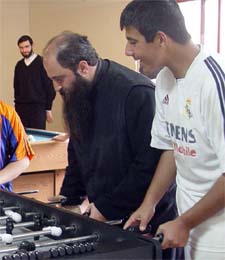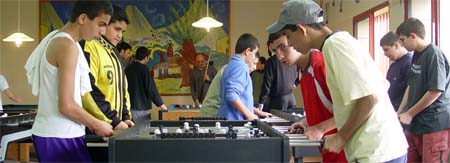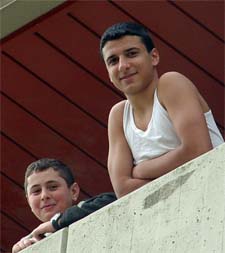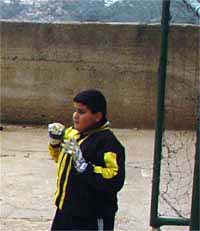 The seminarians were in fine form
when I arrived at the seminary on Friday afternoon. They completed their last
mid-term exams on Wednesday, and following a working Vartanants feastday
(singing and serving the more than four hours of liturgy on Thursday), Friday
was the first of two days off for the young men and their teachers.
The seminarians were in fine form
when I arrived at the seminary on Friday afternoon. They completed their last
mid-term exams on Wednesday, and following a working Vartanants feastday
(singing and serving the more than four hours of liturgy on Thursday), Friday
was the first of two days off for the young men and their teachers.Not surprisingly pick-up games of “football” were the most popular activity
over the two days. Some of the kids spent every minute of their free time either
in or near the soccer pit — an outdoor concrete courtyard also intended for
tennis, basketball, and volleyball but serving almost entirely for soccer. There
is little time for football during
the normal week, only a few hours on Saturdays; not surprisingly, these young
athletes make the most of every available extra minute over their holiday
weekend.
football during
the normal week, only a few hours on Saturdays; not surprisingly, these young
athletes make the most of every available extra minute over their holiday
weekend.
Very much at the centre of the action, Fr. Magar (also a fine singer, and the director of the seminary choir) can generally be found at the football court either serving as referee-coach or playing on one of the teams, usually midfield position. Exceptionally, on Friday, the winning team stays on court to take on challengers, playing until they are defeated; and Fr Magar’s team “holds court” for most of the afternoon. Fr Magar is pictured here (still playing football!) in the seminary rec-room during a rain delay on Saturday morning.

The rec-room is the second most popular place to be during free time at the seminary. Here the seminarians make use of pool and fusseball tables; play ping-pong or chess; and have access to dart boards, exercise bikes and punching bags. Again, the room is normally only open for few hours on Saturdays, so the open rec-room for the weekend following mid-term exams is particularly appreciated.
Most North American kids — or kids most anywhere, for that matter — would
find the life style at the seminary a bit Spartan, to say the least. There’s no
internet, no computer games, little
time for sports, only a couple of hours of television per week (usually a movie
on Saturday night — and only “G” rated movies). The food is nutritious but
simple. The students do all of the cleaning and much of the maintenance at the
seminary; they have a very demanding course of study, and an equally demanding
spritual & liturgical regimen.
little
time for sports, only a couple of hours of television per week (usually a movie
on Saturday night — and only “G” rated movies). The food is nutritious but
simple. The students do all of the cleaning and much of the maintenance at the
seminary; they have a very demanding course of study, and an equally demanding
spritual & liturgical regimen.
Subdeacon Alex tells me that he is the only one left out of a group of 18 boys entering the seminary 7 years ago. It’s not a life style that would suit many teens today, nor is the priestly vocation in the Armenian church meant for everyone either. Still, the small number of students, about 45 in all, an entirely dedicated teaching staff, and the challenges and rewards of the seminarians’ shared vocation make for a real sense of family; and no one seems the worse for the demands and limitations of the seminary routine. Pictured here, Gabriel, the “Benjamin” (youngest) of student population, and first year Theology (college) student, Scribe Mano — watching the action in the football pit, of course!

Sunday, on our way to the Catholicosate, I accompany Fr. Magar and Fr. Tatoul on an errand of mercy. One of the junior seminarians, Zohrab, jammed the middle finger on his left hand while playing in goal (all day!) on Saturday. We take him to a small private hospital in the hills above Antelias. Fr. Tatoul tells Zohrab that they may need to cut off his finger! Zohrab’s panicked reaction suggests that he fails to see the humour in Fr. Tatoul’s remark!
The hospital is impressive. It has about 30 beds, a competent staff, and seems well appointed with operating theatre and basic medical equipment. There is no waiting time at all, and I enjoy listening-in on a multi-lingual conversation, which I gather is the norm for Lebanon. We are greeted with “Bonjour!”, “Kiff-el Hal” (Arabic for “How’s it going?”) Then there’s a, “What’s the matter here?” The conversation is mostly in Arabic, but there is also some pleasant banter with the head nurse in Armenian. I wasn’t directly involved in any of the conversation, so none of the linguistic acrobatics were for the visitor’s benefit — using 3-4 languages is just the normal way of communicating here. (Rather like bilingualism in Montreal!)
All goes well, and within 30 minutes, Zohrab has had an x-ray taken, a splint applied, and we are on our way. He is relieved, but clearly unhappy with the doctor’s admonition, “No football for 3 weeks!” I suggest to Zohrab that at least he has gotten the most out of this special holiday weekend … Today, it is back to school as usual for the seminarians in Bickfaya!










